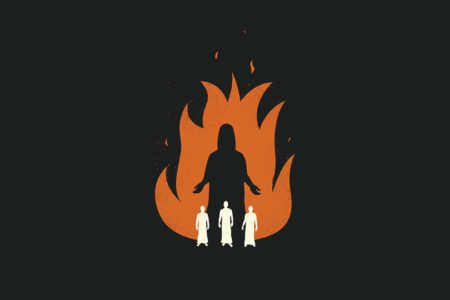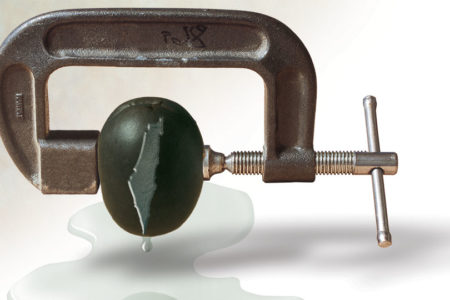Can Israel and Syria Make a Deal?
In spite of all the optimistic talk in Washington, Jerusalem, and Damascus about peace being on the horizon, there are serious questions about how much, in the long run, can actually be achieved. Behind all the public façades of civility lurk some exceptionally difficult issues. Though not often addressed in any detail by the participants or the press, these problems portend some rough going before any meaningful agreement can be reached.
Hafez al-Assad and the Golan Heights
For now, Syrian President Assad is still demanding Israel give back every inch of the Golan Heights. This would mean a return to the pre-1967 armistice lines and would put Syrian troops back into bunkers overlooking the Sea of Galilee and Israeli kibbutzim along the border. Assad’s tough stand against compromise with Israel may well be related to his political survival. He holds a very slim margin of power in his country; only 10% of the Syrian population is associated with his ruling party. If Assad wins big on a total return of the Golan, it will strengthen his hand and that of his son, who is being groomed as his successor. This is of utmost importance to a leader who is in ill health and presiding over a poverty-stricken people.
In Israel, massive demonstrations have been held protesting a Syrian takeover of the Golan. A big issue is security. In 1973 Israel’s possession of the strategic Heights proved to be a buffer that gave the nation time to recover and repulse the initial onslaught of Syrian forces. Without the Golan, Syrian tanks would have penetrated the heartland of Israel before the Israel Defense Force had time to respond.
Israeli Prime Minister Ehud Barak has promised a national referendum on the issue. The vote will give Israelis an opportunity to express themselves on giving up all of the Golan. At the moment, public opinion polls are running 70% against to 30% in favor of relinquishing the plateau.
Displacement of Israeli Citizens
Thousands of Jewish people have made their homes on the Golan since 1967. In Katzrin, the largest of the Jewish communities on the Heights, emotions are in a state of near eruption. Fourteen thousand people, who have made a declaration of solidarity and have sent a message to Jerusalem declaring that they don’t intend to go anywhere, recently attended a town meeting in Katzrin. Katzrin is a beautiful, modern community, where these Israelis have put down roots, reared families, and settled in for life. Residents of the town, along with fellow citizens from numerous kibbutzim on the Golan, argue that they came at the request of the government and do not plan to be uprooted again.
There is another huge problem if Israel relinquishes the Golan. Assad has said that he plans to settle 500,000 Palestinian refugees in the areas vacated by Jews. Is it possible that these Palestinians, who claim the whole of Israel as their own, can be good neighbors? The Jewish people who will be expected to live on the border with the Syrians tend to think not.
Whose Hand Will Be on the Water Tap?
Another volatile issue in the ongoing saga of possible peace between Israel and Syria is the question of who will control the abundant water sources on the Golan. Onesite, Banyas, familiar to New Testament readers as Caesarea Philippi, where Peter made his great confession of the Christ, has a perpetual wall of water flowing out the side of a mountain. Should a deal be struck, Banyas and other rich sources of water will be turned over to the Syrians. Assad promises to be a benevolent distributor of water after he gets what he wants. The majority of Israelis are not so sure. They remember when Syria attempted to divert water from Israeli territory when Syria controlled the Golan before 1967. Only severe military action by Israel prevented it.
Water-hungry Turkish leaders also have their doubts. Recently Turkish representatives discussed the problem with the Israelis. It is no secret that there is no love lost between Turkey and Syria, and the Turkish leaders feel that water in the hands of a Syrian dictator is not a happy prospect.
Religious Commitment to the Golan
Perhaps the most emotional dilemma confronting negotiators is the religious commitment to possess the land given them by God. Many residents of the area regard their rights on the Golan in much the same way as religious settlers on the West Bank. To them, it is not the West Bank; it is Judea and Samaria. Thus they firmly believe that they have a biblical mandate to stay put. Religious residents of the Golan make the same argument. They point out that the area was, since ancient times, the property of the tribe of Dan. Therefore, they see themselves as possessing a title deed from as far back as the days of Moses. Indeed, there is abundant evidence of the Jewish presence on the Golan Heights. Many ruins of ancient synagogues have been discovered there.
The major religious parties in Ehud Barak’s coalition have already served notice that they will leave his government and work to bring it down if a complete withdrawal arrangement is made with the Syrians. No assurances of money from the U.S. and the West will solve this problem. These people are definitely not for sale. They see the Golan as their birthright.
There is no question about it: Ehud Barak, American President Bill Clinton, and Hafez al-Assad have their work cut out for them. For Assad and President Clinton, time is running out. The question for Ehud Barak is how much latitude the Israeli electorate will give him before saying, “It’s a go” or “That’s enough.”






